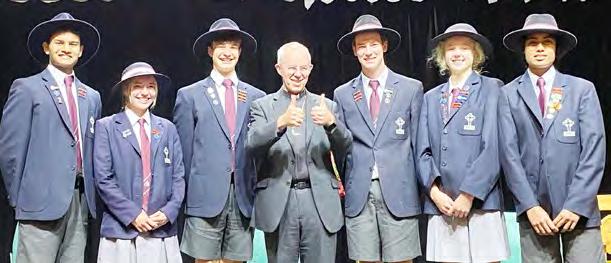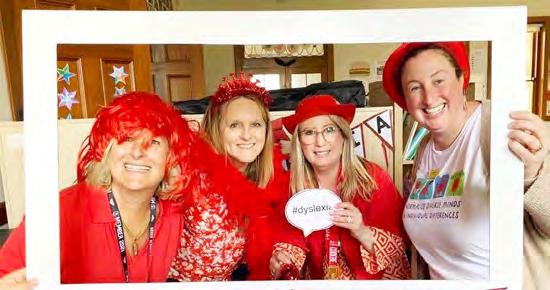
8 minute read
Eva’s Story
Lanfranc Award
ASA CEO The Reverend Peter Laurence OAM was presented the Lanfranc Award by the 105th Archbishop of Canterbury, The Most Reverend and Right Honourable Justin Welby in Perth, WA on Wednesday 5 October.
The award was bestowed in the 2021 Lambeth Awards, with the formal presentation delayed due to travel restrictions. Read more about this prestigious award at https://bit.ly/3V2fGDA

Significant Visit
St Columba Anglican School, NSW
Senior students from St Columba had an audience with the Archbishop of Canterbury, The Most Reverend and Right Honourable Justin Welby.
The student leaders, Meet Panchal, Chloe Schmidt, Ben Maclean, Cameron Grigg, Isla Smith and Sean Govender, travelled to Ballina NSW to represent the School at a public lecture entitled ‘Building Peace in Robust Diversity’ led by the Archbishop. The Archbishop was on a tour of Australia, and it was the first time since 1950 that an Archbishop of Canterbury has visited the Grafton Anglican Diocese.


Eva’s Story
St Peter’s Woodlands, SA
During the month of October St Peter’s Woodlands raised awareness about dyslexia with staff, students and the school community. The school got on board the Code Read Dyslexia Network campaign which aims to provide acknowledgement, support and empowerment for people with dyslexia.
During the month students have had the opportunity to be involved in our annual paper plane challenge, be creative and take a selfie in our photo booth, and dress up for ‘Wear It Red for Dyslexia’. Staff were treated to a red-themed morning tea in recognition of all the amazing work they do in supporting our students with dyslexia.
This year we are shining a light on one of our students with dyslexia, Eva, and her journey.
At St Peter’s Woodlands, student progress is carefully monitored to understand their educational journey and providing proactive support when needed. Students are set up for success with access to high quality and evidence-based teaching in the classroom. Students who require more tailored strategies or supports are supported through our Inclusive Education team, including our Instructional Coach for Literacy, Jo Hirst, who works with classroom teachers to understand how to best support each student. The collaboration between school staff, students and their families is critical to helping each student maximise their potential. You can find out more about dyslexia at the following link. https://youtu.be/oMsv9EgLlts

Powered by Dyslexia
By Eva Pfitzner My name is Eva Pfitzner and I’m ten years old. I love making things with my hands like sculpting clay, drawing and cooking. What I also really enjoy is anything active like playing netball and long distance running. I love how I can move my body and it happens so easily. I feel free. This often isn’t how I feel about learning in the classroom. It can be hard. I have to be really focused all the time and this takes a lot of energy. This is because I’m dyslexic. For me, dyslexia has made reading, spelling, and some maths challenging. It takes me longer to read something and understand it. Sometimes I misread simple words and sometimes pronouncing long words is hard. I can picture a story I want to write in my head, I can see everything about it, but getting the words onto paper takes me a long time. Working hard in the classroom has taught me perseverance, to never give up and that you just have to keep trying new ways to do something. Your brain is a muscle just like your hamstrings and calves. Some might have to be worked harder than others.
I’ve recently been selected to represent South Australia as one of six under 10 Cross Country athletes to compete in the national competition this year. I just won a silver medal for the state cross country titles as well. I started running when I was first diagnosed with dyslexia. Pushing past the pain knowing that I could reach a target is something I have taken from my running and can apply to my learning in the classroom. Both my athletic achievements and dyslexia are powered by the same values - which is to try hard things and to never give up. ‘Dyslexia is a specific learning disorder that is neurological in origin, meaning that it is brainbased. It is characterised by difficulties with accurate and fluent word reading and by poor spelling and decoding abilities that do not progress as expected with the provision of wellintentioned and targeted intervention.’ (dsf – SPELD Foundation)
Click below to see the video of Eva’s Story

ADVERTORIAL

NGS Super is taking action for your future
We’re on our way to being carbonneutral by 2030.
Last year NGS Super announced the move to a carbon-neutral portfolio by 2030. This was in response to clear climate warnings that we could no longer ignore. Environmental impacts and the disruption to economic systems required action. Which is why we’ve made the decision to focus on sustainability and protect our members’ retirement savings. In May this year, we divested approximately $191 million AUD from companies involved in oil and gas exploration and production. This was a significant step towards our 2030 target for a carbon-neutral portfolio. There is no denying that to solve climate change, we need to rapidly transition to energy sources that don’t emit carbon and methane into the atmosphere. We have taken the view that companies whose revenues rely on further oil and gas exploration and production are at risk of becoming stranded assets as the world decarbonises. What does this mean for our members’ super? Acting in the best financial interests of our members is always our top priority, and our carbon-neutral plan aligns with that. We expect to generate higher returns by allocating capital elsewhere, including carbon-positive and lowemission investments. We will support companies building sustainable, lower-carbon business, while aiming to improve on current average longterm investment returns for NGS members. Visit ngssuper.com.au/ESG and watch our Chief Investment Officer to find out more about our reasons for divesting and our progress towards our 2030 carbon-neutral target. If you’d like to talk to someone about your super, book a time to talk to one of our Super Specialists online or over the phone. Making time to have the chat now could make a big difference to your tomorrow. Don’t forget the NGS Super Helpline is available Monday to Friday, 8am–8pm (AEST/AEDT) on 1300 133 177.

Lifted in Spirit: Reflections on Attending the 2022 ASA Virtual Conference
By The Reverend Andrew Stewart | Mentone Grammar, VIC
The 2022 Anglican Schools Australia Conference was once again held virtually but this year delegates had the benefit of being able to gather together in hubs to share in the online experience.
The conference was held only a few months after the release of the first round of data from the 2021 census. This data, when it came to Australia’s religious beliefs, made for pretty sobering reading for the Anglican Church. A fact referenced by Archbishop Kay Goldsworthy in her sermon at the conference service and in her subsequent keynote address. From the 2016 census to the 2021 census the Anglican Church had the largest numerical decline of any religious denomination - declining from 3.1 million adherent in 2016 to 2.5 million in 2021. According to my spur of the moment back of the envelope calculation that meant that on average 328 people left the Anglican Church every day over the past five years. Adherents of the Anglican Church fell below 10% of the population for the first time since census data had been collected. On the one hand these statistics are not a surprise, a number of commentators making the point that the official statistics are catching up with the lived reality of the church facing the decline of nominal Anglicanism. On the other hand, it is hard not to look at these statistics and feel a bit depressed when you think about the future of the Anglican Church. This statistical backdrop highlights what makes attending the ASA Conference such a blessing. While the Anglican Church is facing significant challenges, Anglican Schools offer a beacon of hope for the future. The numbers in the pews may be declining but the numbers in our classrooms are on the rise. While the census revealed that the average Anglican is 56 years old, as a school chaplain, the average age of the students that I work with is 13 years old. There was much to take away from the various conference presentations but one of the things that I really valued was the opportunity to hear stories from former students who were making a real difference in the world around issues of compassion and justice. They were quick to name the fact that their journey of service began thanks to experiences they had shared in their time as a student in an Anglican School. A challenge for those of us involved in Anglican education is to make our students more aware of the richness of the resources offered by our Anglican tradition and heritage. Catholic schools seem to do a much better job at present at ensuring that its former students are much more aware of the church they are staying away from. The ASA is to be commended for its renewed focus on deepening our sense of Anglican identity and demonstrating its relevance for the current generation of students in Anglican Schools. Not an easy task, but clearly a very worthwhile one. There is the perception amongst some in the wider community that the good things that are happening in our schools are happening in spite of the fact that we are connected to the wider Anglican church. The ASA conference reminds us that the good that is happening in our schools is precisely because we are Anglican schools. I was part of the Melbourne hub for the conference that took place at Bishopscourt. Our Archbishop, Philip Freier, and Mrs Joy Freier generously opened their home and we gathered to watch the conference as chaplains, heads and clergy. There was a lovely hopeful atmosphere in the room as we reflected on the critical role that we play in the future of Anglican schools and the future of the Anglican church.





